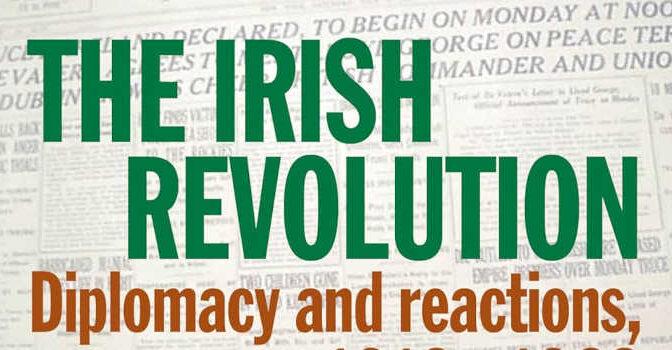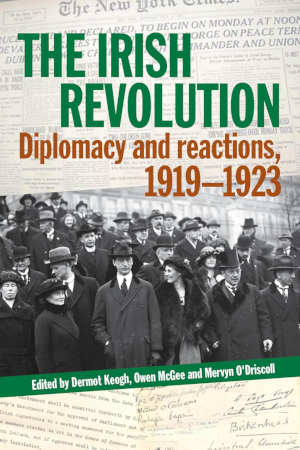The Irish Revolution Diplomacy and reactions review, recensie en informatie boek over de Ierse revolutie. Op 16 oktober 2025 verschijnt bij Cork University Press het boek over diplomatie en reacties op de Ierse Revolutie 1919-1923. Het boek is geschreven door verschillende Ierse historici. Een Nederlandse vertaling is niet verkrijgbaar.
The Irish Revolution Diplomacy and reactions review en recensie
- “A major contribution to our understanding of the revolutionary period, offering fresh insights into many under-explored aspects of the time. A fitting final contribution to the legacy of the late Dermot Keogh.” (David McCullagh, Jounalist and authort of From Crown to Harp)
- “This impressive and timely collection offers an astute analysis of the long underappreciated international dimension of the turbulent period of 1919 to 1923 in Irish history. With its wide geographical range, focusing on Europe, the United States and the Irish diaspora within the British Empire, the book is essential reading for anyone interested in the global repercussions of Ireland’s “Greater War” experience, international relations in an age of revolutionary nation-building, and modern European history.” (Robert Gerwarthe, Professor of Modern History)
The Irish Revolution
Diplomacy and Reactions 1919-1923
- Auteurs: Diverse auteurs (Ierland)
- Soort boek: Ierse geschiedenis
- Taal: Engels
- Uitgever: Cork University Press
- Verschijnt: 16 oktober 2025
- Omvang: 560 pagina’s
- Uitgave: gebonden boek
- Prijs: € 49,00
- Boek bestellen bij: Amazon / Libris
Flaptekst van het boek over de Ierse Revolutie
Discover how Irish revolutionaries transformed their independence struggle into a global diplomatic campaign (1919-1923). Through innovative public diplomacy and diaspora mobilisation, they developed strategies for small nations to influence world affairs. This pioneering study locates the struggle within the context of post-war settlements as Irish republicans sought to shape international relations.
It is often forgotten that leaders of the Irish Revolution considered the domestic and international campaigns for Irish independence to be organically linked. Focusing on this dimension can relocate the Irish struggle in its original and fullest context.
This collection of essays follows the activities of Irish envoys abroad over four years as they defended the right of Dáil Éireann to self-determination and lobbied for its recognition in the capitals of Europe and the British Commonwealth, as well as in the United States. The global impact of Terence MacSwiney’s hunger strike protest is highlighted, as well as the important role played by Catholic networks, disapora activists and women volunteers.
By reconsidering its international dimension, this book locates the Irish Revolution within an appropriate background of post-war settlements that were not only contested but also remained comparatively fluid. Cultural repercussions of the Irish struggle are also examined at a time of growing international debate about small, emergent states and the existence of contested state boundaries arising from the upending of the old international order caused by the First World War.

